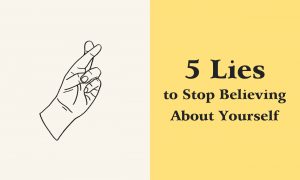Why We Put Up With Bad Friendships
Have you ever wished that your relational life was like Sisterhood of the Travelling Pants? Surrounded by people who are all supportive, who want the best for you and will go to bat for you; who know when you need picking up and when you need a stern word.
Instead, friendships are often a tricky arena. Things aren’t that simple, and at times, they aren’t even healthy.
I think of my “best friend” in primary school who told me I was “getting fat”, gossiped about me behind my back, and frequently reminded me that her family was richer than mine. Then there was a close friend in high school who would purposefully encourage me to wear things that didn’t suit me, and who convinced our entire friend group to get group photos taken at our senior ball without me.
Yet, I still invited them to my birthday party, sat with them at lunch, and still, for all intents and purposes, called them my “friends”.
Perhaps you too have unhelpful and unhealthy friendships? I’m not talking about instances of tension or working out conflict, which are normal. I’m referring to patterns of negative behaviour that leave you feeling like a lesser person in the relationship:
Subtle putdowns often said in jest. Some friend who always seems to speak down to you, almost implying that they’re more successful in life than you are.
Or friends who keep you in a state of uncertainty, where you aren’t sure what version of them you’ll get that particular day.
Or friends who always seem to need help and support, but never seem to reciprocate when you need someone to have your back.
So why do we allow this? As I share and explore a few suggestions, I wonder if we could be curious about what we may need to relearn in the relational aspect of our lives.
Firstly, we would rather have something than nothing. We let others treat us however they like, because we figure that is better than being alone. We are fearful that if we pushed back, we would be abandoned.
There’s both good and bad in our desire to not be alone. The good is, humankind is really made for relationship (Genesis 2:18). Part of us being created in God’s image is being a relational being.
The problem is, we can fear being alone to an unhealthy degree. I suspect this aversion of solitude is twofold:
1. It can be scary when the noise of being busy and surrounded by others dissipates, and we’re left with our own thoughts, some of which we don’t dare to face.
However, we see in Scripture that it’s normal to have times of solitude (Jesus Himself often withdrew to be alone) and times of loneliness (my heart is comforted by Psalm 16, where we read of David being lonely and abandoned, yet God was present and faithful).
2. I suspect we also equate being alone with being unimportant or worthless. That if others don’t want to be with us, we must not be worth the time.
And herein lies a deeper reason we keep unhealthy friendships: we figure that we are unlikely to find better friends, because we don’t think we’re that great to begin with.
Recently, I made my husband watch the remake of Mean Girls, and I was struck by the scene of Gretchen’s solo in Queen Bee Regina’s wardrobe. “What’s wrong with me?” She sings, “How I speak, how I dress?”
Perhaps, like Gretchen, we’re also accustomed to singing, “What’s wrong with me?”.
I would say that this is potentially the foundational issue. Because of this negative view of self, we tolerate being treated badly. It seems easier to let others do as they wish with us, because in some ways it makes us feel needed and of value.
A negative view of self— a deep sense of self-disdain—is not biblical. It’s not consistent with how God wants us to see ourselves (Psalm 139:13-14, 2 Corinthians 5:17,21). As God’s image bearers, we are His representatives on earth, created for good works that have been prepared for us (Ephesians 2:10). We have a glorious calling and noble purpose that’s entirely incompatible with seeing ourselves as “wrong” and worthless.
Another reason we tolerate bad friendships? We want to be nice, friendly, “inclusive” of others.
We think this means putting up with bad behaviour for the sake of “keeping peace”, or not “judging” others for acting a certain way. For those of us who are naturally non-confrontational, it can feel too much to speak up about how we actually feel. This can be observed from our conversations, where often we aren’t brave enough to say to someone, “That’s kind of mean,” or “I don’t like that”.
Perhaps we don’t see how we can call people out without seeming harsh. Isn’t being “kind” and “forgiving” the Christian thing to do?
“Aren’t we taught to turn the other cheek?” I hear you say, and yes, we are (Matthew 5:39). But this scripture is speaking about not getting revenge or paying others back for their wrongdoings towards us. It is not saying we must allow people to keep harming us.
It is biblically correct to engage in friendships that speak the truth in love (Ephesians 4:25). Proverbs 27 tells us that wounds from a friend can be trusted (v.6), and that we are to sharpen one another (v.17).
I’ve heard it said that not everything that hurts brings us harm, and not everything that harms us hurts. We need to consider the motivation behind our actions and those of others.
Recently my daughter stood on a particularly sharp prickle in our garden. To get the barb out, I had to squeeze the skin around her foot pretty hard, which hurt! But if I had been unwilling to cause that temporary sting, things would have been much worse.
When we draw boundaries with others, like pointing out something hurtful they are doing—especially to us—we are being loving by helping them see what’s wrong and offering them the opportunity to change.
If you’ve got an overly braggy friend, or someone who is a master of the subtle putdowns, you can start by telling them gently how their words are coming across; this gives them the chance to at least hear a different perspective and become aware.
A third reason we tolerate harmful friendships? We want to believe the best in people, that they’ll eventually change if we would stand by them.
I was trying really hard to witness to my best friend in high school (the one who purposefully left me out of the friend group photo), and I’d invite her to youth group and church camps. Since I was the only Christian she knew, I felt a strong obligation to continue our friendship, even when it clearly wasn’t good for me.
While we can communicate our boundaries, we cannot change people. Be they a bad boyfriend or a bad friendship, we cannot curate them into being any different than what they decide to be.
We are not called to engage in unhealthy relationships for the sake of evangelism. Even Jesus, who embodied kindness and love, did not simply let people do whatever they wished to Him just so they would be convinced to believe the gospel. I think of Jesus’s instruction to the disciples in Matthew 10 (vv.12-14). He tells the disciples to let the people receive them into their homes, but if the people don’t welcome or listen to them, the disciples are to leave.
If you find yourself trapped in the tangle of unhealthy friendships for one of these reasons, my prayer for you is that you would:
1) let God heal your negative self-view and fear of being alone;
2) learn that being loving is more than being “nice” and “inclusive”; and
3) understand that God does not expect us to stay in unhealthy relationships for the sake of witnessing for Him.
As we learn to turn away from unhealthy friendships, here are three suggestions for how we can seek out more life-giving friendships:
First, pray for it. I have had several instances in life where I’ve prayed specifically for friendships, and God has come through each time. He may not come through as quickly as we want, or provide a Taylor Swift-esque ‘squad’, but be in prayer for good friendships.
Second, do a stocktake. The relationships you cultivate, are they the kind that build you up (even if at times you don’t agree with the other person or you’ve experienced conflict)? Are they drawing you closer to Christ, or encouraging you to grow in Christ? What can you do to invest more in this kind of friendships?
Third, be proactive. It takes courage and effort, but as we grow older, we need to be more intentional in pursuing friendships that will be fruitful.
Recently, there was a lady I enjoyed chatting with at school pickups. I didn’t know many mums at school, so I summoned all the extrovert within me and approached her, and as we got chatting, I suggested getting coffee. She’s one of the most life giving people I’ve ever met.
It can be scary, but if you need good and godly relationships, and there are people you know of who might be that—go and ask them to hang out. It could well be that you’re just one ‘Deep and Meaningful’ (conversation) away from a true friendship.
















Leave a Reply
Want to join the discussion?Feel free to contribute!